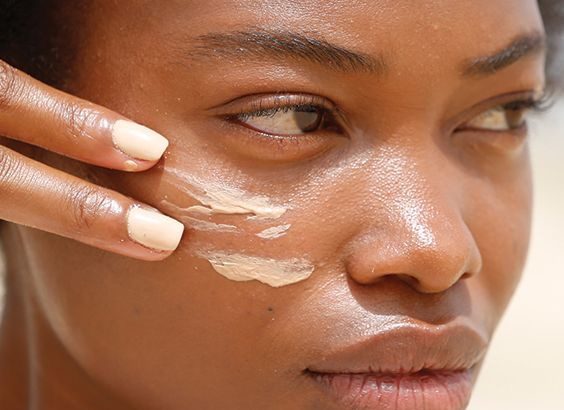UNDERSTANDING YOUR SKIN TYPE.
The human skin which is the largest organ of our body is one of the most beautiful and miracle given to us by our Maker. Our skin, provides a tough, flexible covering with many important functions. Just to mention a few, this is what the skin does:
1. The outer surface of our skin is bactericidal- which helps prevents the multiplication of harmful micro organisms.
2. It also prevents the absorption of many substances . This is so because of the construction of the cells on its outer surface which forms a barrier. Unless we have a cut on the skin.
3. Our skin produces its natural oil, what is called sebum, secreted by the sebaceous glands, which moisturizes our skin naturally and prevent the skin from losing its vital water.
Our skin contains a pigment called melanin. This melanin absorbs harmful rays of ultra-violet light.
- So coming to know why our skin is so important, how about knowing your specific skin type? Knowing your skin type can help you make the right choice when it comes to choosing skincare products.
All of us, as humans have the same basic skin structure, but the physiological functioning of our skin varies from one person to the other. That is what gives us skin types, which is recognized by specific visible characteristics.
THESE FACTORS DETERMINE THE TYPE OF SKIN YOU HAVE.
- Your genes determines whether you’ll have an oily skin, dry skin, combination, etc which you might inherit your mom or dad’s skin type.
- Our hormones changes in every time of our lives- starts from puberty, pregnancy which can affect how our skin behaves.
- Medications can have effects on our skin. Some side effects of medications we take can cause our skin to become more drier or sensitive or oily.
These are the 3 basic skin types.
NORMAL SKIN:
People with normal skin type (you can also call it a balanced skin type) have a balanced water and oil content in their skin. They tend to have smooth blemish-free skin. Not too oily, and not too dry. People with normal skin type tend to have fewer skin problems such as acne, why?
* Because they have good moisture content in their skin.
* Their pore size is small or medium.
* Their skin color is healthy because of the good blood circulation.
* They have a smooth and even skin texture.
Sometimes, people with this skin type tend to neglect taking care of, but if neglected becomes dry, especially areas such as around the eye, neck and cheeks.
If you have a normal skin type, make sure to maintain it by staying away from harsh skincare products and stick to a good skincare routine. Drink plenty of water and eat foods rich in fruits and vegetables and healthy fatty oils.
COMBINATION SKIN:
Have you ever heard of this skin type? Some People with combination skin have an oily area in the center of their face (T-zone) since the sebaceous glands are more concentrated there, with dryer skin around the cheeks while others the exact opposite- oily around the cheek and dryer around the nose and forehead.
People with combination skin:
* Have good skin tone in the oily areas but poor in the dry areas.
* Have uneven pigmentation of the skin.
* Have enlarged pores in the T-zone areas, while in the cheek area are small to medium- and vice-versa.
* Have blemishes such as pustules and comedones on the oily area.
* Have high moisture content in the oily area and poor in the dry areas.
People with a combination skin type are also prone to blemishes. So to help maintain a good appearance of the skin, a regular skin care routine will be a great help. (using a gentle and mild cleanser suitable for your skin type, a mild exfoliant/scrub to exfoliate once or twice a week to clear off build up of dead skin cells, don’t forget to use a non-oily face moisturizer and that will really help).
It’s also important to keep hands away from your face, because the hands keep catching dirt and bacteria you can’t see with your eyes, which can clog your pores!
OILY SKIN:
sebum is very important to keep the skin moisturized and healthy. It is quite common for the sebaceous glands to become super active during adolescent stages because the hormones undergo dramatic changes. Too much sebum can lead to oily skin, clogged pores and acne. But the activities of the sebaceous glands decreases when a person is in his 20’s.
People with oily skin:
* Have enlarged pores.
* Prone to skin disorders such as comedones, milia, or sebaceous cyst, acne.
* Have high moisture content.
* Have uneven pigmentation.
* They may have good skin tone because of the protective effect of the sebum.
If you struggle with oily skin, you must stick to non-oily based skincare products.
Make sure to wash your face not more than twice daily. Over-washing your face might cause dryness and prompt the sebaceous glands to produce more sebum, and can clog your pores. Your facial wash and cleansers should be suitable for your skin type.
Exfoliate your skin at least once a week. Look for plant-based and mild facial scrub suitable for your skin type. However, avoid over-exfoliating which can cause over drying of your skin and more oil production.
Exercising daily increases the flow of blood and it helps nourish our skin cells.
Drinking more water helps to flush toxins or impurities out of our body.
Feed more on Oil-Free diet. Cut off fried and processed foods, same as sweet and sugary drinks. Foods rich in colored fruits and green leafy veggies can strengthens the immune system and protect the skin against infections and free-radicals.
DRY SKIN:
People have dry skin because the sebaceous glands are unable to produce the correct quantity of sebum (oil) needed to stop the skin from losing its moisture content. So to say, it lacks sebum and moisture or both. It loses its elasticity and becomes prone to fine lines- which often results in premature aging. Illness and lack of vitamins A, C, and E can also cause dryness in skin. And as a result, the skin feels dry and kind of flaky or to use the right word, dehydrated!
So people with dry skin:
* Have tight pores.
* Poor moisture content.
* Coarse skin texture and visible flaky skin.
* Premature aging and fine lines which leads to wrinkles around mouth, eye, and neck.
If you have a dry skin type, make sure to drink enough water to stay hydrated.
Additional help is required to help skin feel normal or younger.
Maintain a good skin care routine by moisturizing regularly with skincare products rich in vitamin E, plant oils, mineral oils, Shea butter and cocoa butter. Emollients are necessary to provide dry skin with the one thing it’s missing, the ability to keep moisture in skin.
While you pay close attention to your skin, you may notice one of more additional characteristics . They may be:
* When your skin show high coloring when it is easily irritated.
* When you feel some tightness after you cleanse your skin. Because it is sensitive to pressure.
That’s a SENSITIVE SKIN.
* When Your skin is irritated by external allergens,which includes some chemicals in cosmetics. It’s called ALLERGIC SKIN.
Allergens can cause inflammation to the skin and may damage its protective functions.
Which skin type here do you belong to?
NOTE: Beautiful skin can only be achieved when the skin is healthy.
TESTING YOUR SKIN TYPE:
Wash your face with a gentle facial soap or facial cleanser to take off dirt or oils on the face.
* Gently pat your face with a clean and soft towel and leave it for an hour to dry without to touching your face. DON’T use any face cream or lotion!
* So, after an hour or two hours, look intently at your face in the mirror. How does your face look?
AFTER AN HOUR/TWO
- Face feeling tight and has some flaky patches— Dry skin type.
- Your skin feels shiny and greasy, especially around the center part of your face- —Oily skin type
- Oily around the center of your face which is your T-zone, but dry or normal around your cheek and chin— Combination skin.
- Your skin feeling it’s best. Not too oily not too dry. But balanced moisture— Normal skin.






pop over here lapmjournal.co.uk
What i do not understood is actually how you’re not actually much more well-liked than you may be now. You’re very intelligent. You realize thus significantly relating to this subject, produced me personally consider it from numerous varied angles. Its like women and men aren’t fascinated unless it is one thing to accomplish with Lady gaga! Your own stuffs outstanding. Always maintain it up!
Carlylicy
Aww thanks a lot! I’m grateful for that 🙂